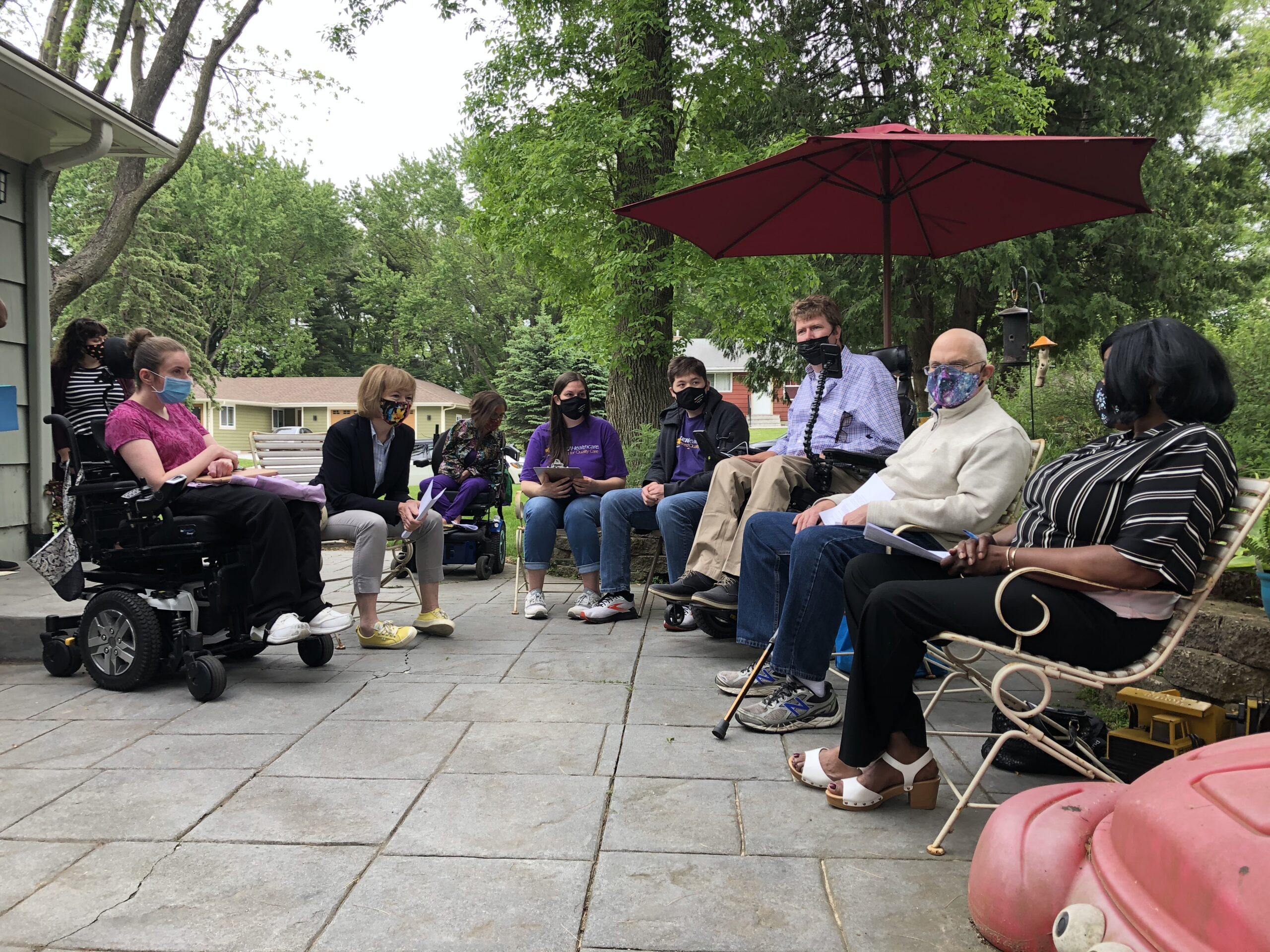

Share
This article first appeared in Union Advocate.
OAKDALE – With Congress poised to take up President Joe Biden’s infrastructure plan this month, workers, retirees and people with disabilities are teaming up to lobby in support of a provision that would provide $400 billion in federal funding for in-home and community-based care.
It’s a pitch home care worker Jacqueline Kelly delivered from her own backyard, along with other advocates, to U.S. Sen. Tina Smith yesterday at a listening session planned by SEIU Healthcare Minnesota, which represents over 20,000 home care workers statewide.

Home care investments in President Biden’s proposal would create an estimated 1 million jobs and improve wages and benefits for workers in the industry. That would be a win for workers, Kelly told Smith, and for the clients they serve, like Kelly’s 16-year-old son.
“I worry that if I can’t offer living wages, benefits and a viable long-term career path, caregivers will choose to move into other employment situations that have more stability and less risk,” Kelly said.
Kelly and other advocates at the event also noted that most home health care workers are women and people of color, who “have been left out or left behind for far too long.”
“After COVID, I hope we all know better now,” Kelly said. “Our communities, our families, our economy – we are all depending on the women doing this work to keep all of our lives going. And what could be more valuable than that?”
Restoring the country
The home care measure is just one part of Biden’s $2 trillion infrastructure proposal. The American Jobs Plan also calls for jobs-creating investments in roads, bridges, transit, schools, housing, manufacturing, research, climate change mitigation and more.
SEIU and other unions are backing the president’s plan. AFL-CIO President Richard Trumka called the “unprecedented federal investment” an important and necessary step toward “repairing, rebuilding and restoring our country.”
“It’s time for Congress to step up and deliver the funding we need to tackle the climate injustice, racial injustice and economic injustice facing working families while creating a new generation of well-paying union jobs,” Trumka said.
Indeed, Biden’s proposal includes “neutrality” language requiring projects funded through the legislation to offer workers a fair opportunity to form a union. That includes expanded support for home health care through Medicaid, which a White House fact sheet asserts would “put in place an infrastructure to create good middle-class jobs with a free and fair choice to join a union.”
An investment in independence
More than 90,000 people work as home health aides and personal care assistants in Minnesota, and home care workers here already have formed a union to improve their wages, benefits and training opportunities.
But advocates say the federal government must do more to stabilize and professionalize the industry’s workforce, which is marked by high rates of turnover.
Lauren Thompson, who has cerebral palsy, told Smith that her struggle to find consistent, affordable home care has “impacted every aspect of my life.” Over the last 10 years, Thompson said, she has bounced between in-home and “facility-style” care, and now lives in a group home with three other people.
“I’m the safest I’ve been in years, but I’ve lost my freedom and my privacy,” Thompson said. “Everyone needs to know that there’s a large demographic of Americans who aren’t truly living free because of this care crisis.”
While some workers rely on roads or transit or internet access to get to work, millions of American workers with disabilities rely on home health care, Rob Wudlick, a clinical research project manager at the University of Minnesota’s medical school, told the senator.
“Being able to live in the community allows me to work,” said Wudlick, who suffered a life-changing injury as a teenager. “Having a strong health care workforce – those are my arms and legs. Without that, I am not able to get out of bed. I would have to live in a facility somewhere and wouldn’t be able to work.”
‘Infrastructure for families’
Smith, a member of the Senate Health Committee, pledged to take the stories of workers and clients back to Congress as debate over Biden’s American Jobs Plan begins. Funding home care is an investment in “infrastructure for families,” she said.
“These jobs have been consistently undervalued, and that has often had devastating impacts, not only for families who need help, but also for the folks themselves that are doing this work and at the same time are often making poverty wages,” Smith said.
The event at Kelly’s home in Oakdale was the first in a series of town halls planned in 23 states, as home care workers, clients and advocates seek to use the power of their personal stories to boost support for Biden’s proposal.

